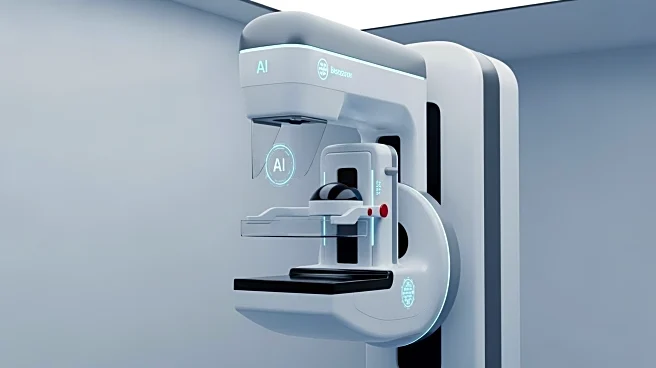What's Happening?
A new artificial intelligence tool, Clairity Breast, has been developed to predict the risk of breast cancer in women up to five years before it develops. This technology analyzes mammogram scans to generate
a 'risk score' indicating the probability of cancer. The tool is particularly valuable as 85% of women who develop breast cancer do not have a family history or genetic mutation. Dr. Connie Lehman, founder of Clairity and a diagnostic radiologist at Massachusetts General Hospital, explained that the AI can learn patterns in mammograms to distinguish between women who will develop breast cancer and those who will not. Despite its potential, experts like Dr. Laurie Margolies from Mount Sinai Health Service caution against over-reliance on the tool, as it does not catch every case of cancer.
Why It's Important?
The introduction of AI in mammogram analysis represents a significant advancement in early cancer detection, potentially transforming how breast cancer is diagnosed and managed. By identifying high-risk individuals earlier, healthcare providers can offer more personalized monitoring and preventive measures, potentially reducing the incidence and severity of breast cancer. This tool could lead to more efficient use of healthcare resources and improve patient outcomes. However, the reliance on AI must be balanced with traditional diagnostic methods to ensure comprehensive care. The tool's affordability and insurance coverage are crucial factors in its widespread adoption, which could democratize access to advanced diagnostic technology.
What's Next?
Clairity Breast is currently working on securing insurance coverage for the test, aiming to offer it for less than $200. The goal is to make this AI tool widely available to women during routine mammograms, potentially changing the landscape of breast cancer diagnosis. As the technology gains traction, it may prompt further research and development in AI-driven diagnostics, encouraging healthcare systems to integrate such tools into standard practice. Stakeholders, including healthcare providers and insurance companies, will need to evaluate the cost-effectiveness and clinical benefits of adopting this technology on a larger scale.
Beyond the Headlines
The use of AI in healthcare raises ethical and legal considerations, particularly regarding data privacy and the accuracy of AI predictions. Ensuring that AI tools are used responsibly and ethically is crucial to maintaining patient trust and safety. Additionally, the integration of AI in diagnostics could lead to shifts in medical training and practice, requiring healthcare professionals to adapt to new technologies and methodologies.











